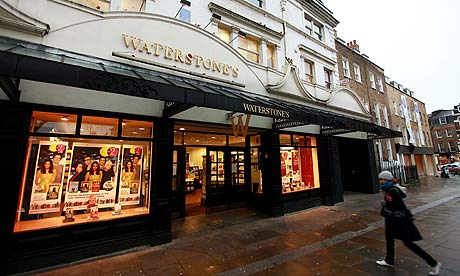
Rebel shareholders have opened fire on music shops chain HMV over its management of Waterstone's, Britain's largest books retailer. Investors want HMV chief executive Simon Fox to sell the book business if a turnaround strategy unveiled in March fails to boost returns by this time in 2011.
Waterstone's margins are thin: last year, profits came in at £2.5m generated from turnover of £500m "which is woefully inadequate," says Matthew McEachran of Singer Capital Markets.
A shareholder said: "Although Waterstone's accounts for around a quarter of HMV's turnover, it has a perfectly viable business without books. The day of reckoning is fast approaching."
Ben Hunt, analyst at Oriel Securities said: "In theory, there would not be a great deal to lose, in terms of supply chain benefits, if HMV were to separate from Waterstone's, should the turn around plan prove unsuccessful."
Another investor said: "They [HMV] have struggled to capitalise on their ownership of Waterstone's in a way that makes me think more could be achieved if it operated independently of the parent group."
HMV will publish a trading statement next month that will be closely scrutinised by the City for signs that book sales are heading north. Alarm bells rang in the Square Mile last Christmas when HMV disclosed that like-for-like sales at Waterstone's had slumped by nearly 9% during a period viewed as peak trading time.
Following the collapse of Borders last year, Waterstone's is now Britain's last major book chain, with a national presence of 300 shops. It was established by founder Tim Waterstone in 1982 after he was sacked by WH Smith. Waterstone's was sold to HMV in 1998.
Book chains have been hit by ferocious competition from internet retailers such as Amazon and Play, and supermarkets. New devices like the kindle e-reader have raised concern about the long term viability of high street bookshops. Some analysts estimate that sale volumes could decline at the rate of 4% a year over the next decade.
In the City there is speculation that Waterstone's could eventually be sold to management with private equity backing. Another theory is that Tim Waterstone will emerge to buy back the business.
But a spokesman for HMV said: "We have a clear strategy for the turnaround of Waterstone's, focused on reinforcing our credentials as a range bookseller and helping stores reflect the local interest of their customers. Although we are only a few months in with this strategy, we are making very good progress and our initiatives have been very well received by the wider book industry." Insiders said, at present, there was no intention to sell.
Despite problems at Waterstone's, and reports of low staff morale, HMV last month revealed that group profits had risen by more than 12% following a strong showing from its core music and entertainment business. Fox said at the time that HMV was "on track" to transform the company into a broad based entertainment brand after a move into live music and ticketing. The idea is to be less dependent on CD and DVD sales.
Plans to reverse the fortunes of Waterstone's took a turn for the worse last year after the bungled opening of a new centralised distribution centre, or hub. HMV parted ways with managing director Gerry Johnson and appointed Dominic Myers.
Fox told the Guardian earlier this year that he accepted blame for Waterstone's woes during the three years he has been at the helm. Turning around the last large specialist chain of bookstores in the UK was a matter of "urgency," said Fox. He pledged to focus more on what customers want, to tailor stores to local markets and to accelerate online and digital book growth as customers' habits change. He also said that there would be less reliance on big celebrity titles and more scope for specialist and quirky offerings.
Last year HMV paid £46m to increase its stake in the Mama group to 50%, giving it control over venues such as the Hammersmith Apollo and the Jazz Cafe, as well as the Lovebox festival and SuperVision artist management, which looks after Franz Ferdinand and Kaiser Chiefs. It has also started a festival, the Next Big Thing, which focuses on emerging acts.
The company is also trying to link ticket sales, physical products and live shows to maximise profits. "We would like to see a world where every time someone buys a ticket from us they can get a digital track from the artist," said Fox.
• This article was amended on 31 August 2010. The original named the Waterstone's managing director as Dominic Myles.

